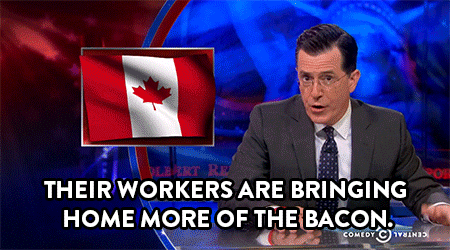There's a huge spike in Americans searching for jobs in Canada

A growing number of Americans are seeking jobs north of the border according to data recently released by job site Monster.
“It sounds like a joke,” says Arturo Gallo, content manager with Monster Canada. “But we found really surprising results.”
According to Monster, 58 per cent more Americans are searching for jobs in Canada, compared to 2015 with over 30,000 job searches involving the keyword running through the Monster U.S. platform.
“Compared to last year, that’s quite a spike,” says Gallo.
Of the provinces, Ontario was the most attractive amongst job seekers with 7,500 Americans looking for jobs in that region. Toronto alone had 3,000 searchers. Alberta came in second, with a focus on Edmonton and Calgary, while British Columbia sat in third place with close to 1,300 seekers looking there. Quebec and New Brunswick followed in fourth and fifth place respectively.
The top job categories were: engineering, IT, accounting, sales and human resources.
“All these categories are spread wide across Canada but I think the perception of Toronto being the largest city and where the business is concentrated is what maybe triggered them to look for jobs there,” explains Gallo. “Then you have Alberta and the oil (industry) which also attracts a lot of Americans.”
He pointed to Montreal and Waterloo as technology-concentrated hubs or “Silicon Valley North” as a key hook for IT-focused job searchers.
While Monster didn’t collect data on the age groups or whether seekers were after entry-level or more senior roles, Gallo says he suspects many of the seekers would fall in the 30- to 50-year-old range.
“For the millennial group entering the workforce, this would be the first election so thinking about moving to a different country might be a little awkward,” he says.
But he points out it’s worth noting to our American compatriots seeking to eke out a living north of the border, it’s a little more challenging than just applying.
For starters, any jobs they’re searching showing salaries will be listed in Canadian dollars, which, with the Canadian dollar sitting around 74-cents US at press time is a pay cut. And secondly, making the move is not as easy as just applying for a job online.
“There are many different ways to access Canada but it has to go through a very time consuming legal process,” he says adding that while you can pay fees to accelerate the legal process those can cost you in the realm of $7,000 to $10,000.
Then there are the taxes on those salaries.
“Don’t forget, we’re a highly-taxed country compared to the U.S. and certain regions,” he says. “They also need to consider that and the cost of moving (which) can rise to $20,000.”
Another element to consider is qualifications. Gallo points out that while you may be highly qualified on paper, those credentials may not translate cross-border.
“You have to make sure your studies are validated and you might even need to go back to school and study for one or two years in order to get your certificate equivalent according to Canadian standards,” says Gallo.
Not that he’s trying to shatter those Americans’ Canadian Dream. He points out that while it may be easy for someone like Bryan Cranston to say he’ll move to Canada if Trump wins, for the average person who feels paranoia surrounding the state of the American political system “there’s a process that has to take place.”
“And it’s a costly process,” says Gallo. “Timely and money-wise.”

 Yahoo Finance
Yahoo Finance 